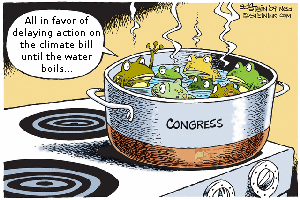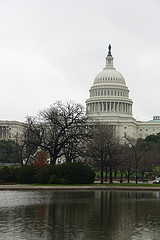 After months of inaction by Congress, the Senate has finally decided to twiddle its thumbs some more. Note that the comic was actually published last Friday. Lest you think Stein is a modern day Nostradamus, it’s not that surprising given our nation’s poor record on global warming… but terribly disappointing nonetheless. Continue reading
After months of inaction by Congress, the Senate has finally decided to twiddle its thumbs some more. Note that the comic was actually published last Friday. Lest you think Stein is a modern day Nostradamus, it’s not that surprising given our nation’s poor record on global warming… but terribly disappointing nonetheless. Continue reading
Tag Archives: ACES
Losing Support

The U.S. Chamber of Commerce is losing popularity among U.S. corporations — fast. The Washington Post recently reported that Apple is revoking its membership in protest over the Chamber’s stance on global climate change, specifically its stance against congressional legislation that would reduce CO2 emissions. Other companies to recently pull out include Pacific Gas and Electric, PNM Resources, and Exelon. Nike resigned from the Chamber’s Board, but not its membership. Given Apple’s popularity as a computer giant, the news marks hightened attention to private sector influence over climate change policy and emission regulation.
Thomas J. Donohue, the Chamber’s president, commented that while the group supports federal climate change legislation, the cap-and-trade legislation passed by the House of Representatives was flawed since it does not require other polluting countries to act. Mother Jones Magazine offered a different take and reported on the Chamber’s past record of investing millions of dollars lobbying congress to oppose the Markey-Waxman bill and threatened to sue the EPA if they continued to regulate CO2 as a pollutant. Over the next few months, it will be interesting to watch if other companies follow suit and what impact that will have on the Chamber, as well as domestic climate legislation.
Global Climate Chicken
Congress will have a lot on its plate when it returns to session in approximately two weeks: health care, war/torture, food safety and of course climate change. Indeed, it’s beginning to look like, once again, the hopes of significant international effort to redress global warming are—arguably with good reason—landing square on the shoulders of Uncle Sam. As reported in many places yesterday, the Indian government has all but asked to be shamed into participating, and for developed nations to “call it’s bluff.” In a similar vein, and also making the rounds on Wednesday, was a statement from the Swedish minister of environment suggesting that: If the U.S. leads, China will follow. Alas, the fate of Waxman-Markley is still unclear, but at least this time Congress seems to be working towards the goal before international negotiations begin rather than against it. Perhaps you’d like to give your elected officials an encouraging nudge?
Everything’s ACES
 Still wondering just what ACES a.k.a Waxman-Markley, or “The Climate Bill,” is all about? Perhaps this brief interview with the president of the Alliance to Save Energy will help. Of course, then there’s the question of whether it’s too little too late, too much too soon, or just right? Bill Moyers’ guests this week say it’s not enough. I tend to agree, though I’m not entirely convinced it’s the false start they’d have us believe. Regardless, the summary of Waxman-Markley’s measures seems fairly moderate. Indeed, the building code changes it calls for are only slightly higher than future federal regulations!
Still wondering just what ACES a.k.a Waxman-Markley, or “The Climate Bill,” is all about? Perhaps this brief interview with the president of the Alliance to Save Energy will help. Of course, then there’s the question of whether it’s too little too late, too much too soon, or just right? Bill Moyers’ guests this week say it’s not enough. I tend to agree, though I’m not entirely convinced it’s the false start they’d have us believe. Regardless, the summary of Waxman-Markley’s measures seems fairly moderate. Indeed, the building code changes it calls for are only slightly higher than future federal regulations!
P.S. GovTrack has some interesting tools to let you monitor the progress of bills like ACES.
Climate Bill Passes the House
 The controversial climate bill passed through the House on Friday and pressure is mounting for the leadership in the Senate to take up the bill. Republicans see the climate bill as too costly for for households and view the bill’s carbon reduction mandates as having a harmful effect on industry. Some environmentalists are also not in support of the house bill, raising concerns over the reduction targets being too low and giving carbon allowances away to industrial polluters.
The controversial climate bill passed through the House on Friday and pressure is mounting for the leadership in the Senate to take up the bill. Republicans see the climate bill as too costly for for households and view the bill’s carbon reduction mandates as having a harmful effect on industry. Some environmentalists are also not in support of the house bill, raising concerns over the reduction targets being too low and giving carbon allowances away to industrial polluters.
It is likely the Senate will vote on a version of the bill by fall, which would then need to be hashed out between the two houses. The climate legislation is a contentious bill for republicans and industry with many legislators calling global warming an outright hoax. Paul Krugman published an article “Betraying the Planet,” in the New York Times on how majority of the climate bill no votes were from global warming denialists.
In addition, even though the American public wants to see action on climate change, there is growing concern about cap and trade and the potential cost impacts that will have on their wallets. Independent research groups have estimated the climate bill will cost taxpayers approximately $175 per year, while industry is estimating much higher costs to American citizens.
The United States is also facing international pressure to have a strong climate policy in place for the United Nations Climate Conference in Copenhagen in December to develop a new Kyoto protocol. It is likely that a national climate bill will be passed by the end of the year, but it is unclear whether the US’ national climate bill will lead the way or serve as an ineffective panacea to our growing climate crisis.

